Taiwan President Tsai Ing-wen took the oath for her second four-year term on Wednesday, buoyed by record-high popularity as the country continues its successful response to the COVID-19 pandemic.
Tsai also pledged to engage in dialogue with Beijing provided it respects Taiwan’s sovereignty and rejects its “one country, two systems” formula, reiterating the cross-strait stance that fueled her landslide re-election victory in January.
In a scaled-down inauguration ceremony at which a limited number of participants practiced social distancing, Tsai praised the resilience of the Taiwanese people in dealing with the coronavirus. Taiwan has confirmed just 440 cases and seven deaths; it has recorded no new cases since May 7 and has not seen a locally transmitted case since April 12.
Taiwan’s containment of the virus has “amazed the international community,” Tsai said during her inaugural address.
While Taiwan dropped its bid on Monday to participate as an observer at the World Health Assembly due to opposition from Beijing and other China-friendly members, its dedication to providing proactive assistance to other countries suffering COVID-19 outbreaks has coalesced with Tsai’s stewardship of a bolder Taiwan that seeks to assert itself as a nation, outside the sphere of cross-strait affairs.
Tsai focused much of her address on pledges to build upon the foundation set during her first term, including moving Taiwan’s industrial manufacturing into next-generation technology industries, expanding the military’s capabilities in asymmetric warfare, and judicial reform.
“I am going to reinvent Taiwan and lead our country into the future,” she said.
Tsai was given a mandate in January to do just that. Voters handed her a decisive victory after her refusal in January 2019 to accept Chinese leader Xi Jinping’s “one country, two systems” framework, followed by her steadfast support of Hong Kong’s pro-democracy movement.
After her January election victory, Tsai responded to a reporter’s question on Taiwan’s independence by saying the country is “already independent” and has no need to formally declare it.
But China has flown military jets close to Taiwan’s airspace and has accused Taiwan of using the coronavirus for political reasons, making it likely Tsai will be tasked with fending off a more aggressive Beijing during her second term.
Visitors from foreign governments did not attend Wednesday’s ceremony due to coronavirus travel concerns, but Tsai was congratulated in a statement by U.S. Secretary of State Mike Pompeo. One researcher told Taiwan’s state-run Central News Agency that Pompeo is the highest-ranking U.S. official to congratulate a Taiwan president since the United States switched ties from Taipei to Beijing in 1979.
Pompeo’s words, which were read aloud at the ceremony, prompted a statement from China’s defense ministry expressing “strong dissatisfaction” and “firm opposition” to his remarks.
Matthew Pottinger, senior director of the U.S. National Security Council, was one of 92 foreign dignitaries to congratulate Tsai through video messages.
Along with beginning her second presidential term, Tsai will resume her leadership of the Democratic Progressive Party (DPP). Tsai had stepped down from the chairmanship in November 2018 after the party was defeated in regional elections.
William Lai, Tsai’s former premier and 2019 DPP primary challenger, was sworn in as vice president, replacing the outgoing Chen Chien-jen. Current Premier Su Tseng-cheng, a popular figure credited with assisting in Tsai’s rebound in popularity last year, will retain his post.
Along with Su, most cabinet members remained in their posts, including Foreign Minister Joseph Wu and Chen Shih-chung, the health minister who also helms Taiwan’s epidemic command center and has been instrumental in the country’s success in combating the coronavirus.
Former cabinet spokesperson Kolas Yotaka was appointed to be spokesperson for the presidential office, becoming the first indigenous Taiwanese official to hold either position. Su Jia-chyuan, the former legislative speaker who was floated last year as a running mate for Tsai, will take over as presidential secretary-general.
The cabinet saw some minor reshuffling, with Wellington Koo, formerly chair of the Financial Supervisory Commission, appointed to head the National Security Council. David Lee, the council’s former head, will chair the Straits Exchange Foundation, a semi-official organization that handles business matters with Beijing.
Taiwan’s National Security Council has often found itself under the domestic microscope as Beijing has intensified influence operations, including financing China-friendly TV, print, and online media outlets in Taiwan and its alleged efforts to spread disinformation on social media.
Analysts have predicted Taiwan-U.S. ties will remain strong, and Wu, the foreign minister, told The Atlantic he believes the United States will continue its support of Taiwan should President Donald Trump lose November’s election to challenger Joe Biden.
There is pessimism, however, that ties between Taipei and Beijing will improve. China severed official communications with Taiwan in 2016 after Tsai’s first election and, despite Tsai’s numerous offers to restart dialogue, it has shown no signs of being willing to do so.

































